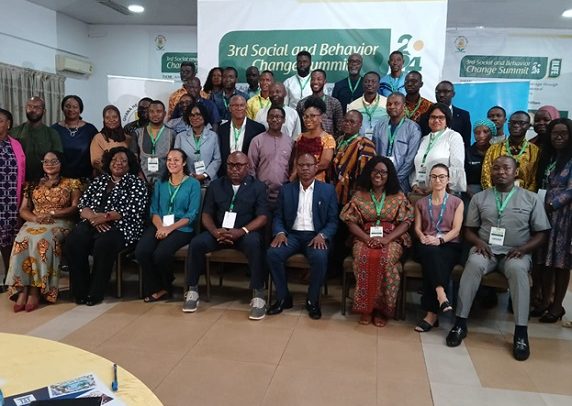Dr. Patrick Kuma-Aboagye (seated 4th from right) and other participants at the SBC Summit
Director-General of the Ghana Health Service (GHS) Dr. Patrick Kumah-Aboagye, said the evidence-based Social and Behavior Change (SBC) interventions are pivotal in driving sustainable health outcomes under the Universal Health Coverage (UHC) framework.
He emphasised that by harnessing the power of data-driven insights, “these interventions will not only inform but will empower individuals and communities to adopt healthier behaviors, thereby reducing the burden of preventable diseases such as malaria, hypertension, diabetes, tuberculosis and diarrhea.”
Universal Health Coverage, he said, remains a beacon of equity and justice in healthcare systems worldwide, adding that, it embodies the principle that all individuals and communities should have access to essential health services without financial hardship.
“Achieving UHC demands collaborative efforts across sectors such as healthcare, education, and policymaking, it requires us to innovate continuously, leveraging technology and community engagement to reach marginalised populations effectively,” he said.
“By fostering partnerships and embracing innovation, we can create a resilient health system that leaves no one behind,” he added.
He said while the road to UHC is fraught with challenges, financial constraints, infrastructure gaps and socio-cultural barriers, it presents immense opportunities to confront challenges head-on, and chart a course towards a healthier and more equitable future for all.
He, thus, urged all participants to harness the power of evidence, innovation and collaboration to build resilient health systems that upholds the dignity and well-being of every individual.
He said this during the opening of the 3rd Social and Behavior Change (SBC) summit which took place at Mensvic Hotel, Accra, on the theme “Achieving Universal Health Coverage based social and behavioral change interventions.
The agenda of the three-day summit includes, equitable access to healthcare (that is, strategies for ensuring that marginalised and underserved populations have access to healthcare services), primary healthcare and preventive services aimed at promoting preventive services and early intervention to reduce healthcare costs and improve outcomes and community engagement and participation (that is, involving communities in the design and implementation of SBC health interventions).
The chairperson of the 3rd Social and Behavior Change (SBC) summit, Prof. Elvis Tarkang, said in his view, the summit represents the entire globe and a platform to explore latest research, share knowledge and expertise innovations in social and behavior change.
Mr. Tarkang, who is also the Dean of International Programmes , University of Health and Allied Sciences, said the complex challenges such as the health pandemics, climate change, and social injustice and inequalities facing our world, continent, countries and communities requires more than just technical solutions, hence, it demands a deep understanding of human behavior and social dynamics.
For her part, Acting Director for Health Promotion Division, Ghana Health Service (GHS), Mabel Kissiwah Asafo, said the importance of Social and Behavioral Change Interventions is crucial in shaping health behaviors, influencing policy and ultimately improving health outcomes for communities around the globe.
“In a world where health disparities are ever more visible, and where the quest for Universal Health Coverage remains a pressing challenge, our summit serves as a beacon of hope and a catalyst for change,” she stated.
This summit, she said, is not just a platform for discussion but a call for action and an opportunity to create partnerships, develop actionable plans and commit to driving change in their respective spheres of influence.
“Let us strive to harness the power of evidence-based SBC interventions to achieve Universal Health Coverage and improve the health and well-being of communities worldwide,” she advised.
By Janet Odei Amponsah


